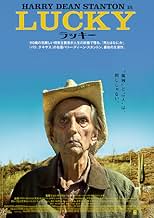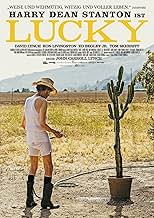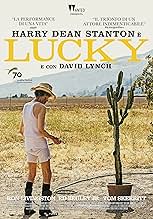Lucky
- 2017
- Tous publics
- 1h 28min
NOTE IMDb
7,3/10
28 k
MA NOTE
Lucky suit le voyage spirituel d'un homme athée de 90 ans et des personnages décalés habitant sa ville déserte qui ne figure sur aucune carte.Lucky suit le voyage spirituel d'un homme athée de 90 ans et des personnages décalés habitant sa ville déserte qui ne figure sur aucune carte.Lucky suit le voyage spirituel d'un homme athée de 90 ans et des personnages décalés habitant sa ville déserte qui ne figure sur aucune carte.
- Réalisation
- Scénario
- Casting principal
- Récompenses
- 17 victoires et 19 nominations au total
Pam Sparks
- Pam
- (as Pamela Sparks)
Ulysses Olmedo
- Juan Wayne
- (as Ulysses Olemdo)
Avis à la une
If ever there was a deserving send off for a grand actor, then this be it.
As "Lucky", the cantankerous but lovable old sole, shuffling his way out of this mortal coil, Harry Dean Stanton is, as always, remarkable.
Striding with purpose, very slowly, through a very regimented daily routine - diner coffee, crossword, game shows, cactus watering, smokes, drinks at the local watering hole - Lucky is revealed as a complex, always thinking, opinionated, ready to drop the gloves, 91 year old.
There are several great performances, highlighted by David Lynch bemoaning the escape of his pet tortoise, but the film really belongs to Harry. Swiping some great real life histories (Stanton's stint with the Navy) blurs the line between fact and fiction just enough to act both as a fitting tribute and engrossing movie on it's own merit. This is a talkie, where action moves at a tortoise pace, but it matters not, for Lucky has that rare power to draw the audience right on in.
Among the many low key but brilliant highlights, is a stirring scene to which Johnny Cash sings Bonnie Prince Billie's "I See a Darkness".
Harry Dean Stanton was indeed Lucky.
As "Lucky", the cantankerous but lovable old sole, shuffling his way out of this mortal coil, Harry Dean Stanton is, as always, remarkable.
Striding with purpose, very slowly, through a very regimented daily routine - diner coffee, crossword, game shows, cactus watering, smokes, drinks at the local watering hole - Lucky is revealed as a complex, always thinking, opinionated, ready to drop the gloves, 91 year old.
There are several great performances, highlighted by David Lynch bemoaning the escape of his pet tortoise, but the film really belongs to Harry. Swiping some great real life histories (Stanton's stint with the Navy) blurs the line between fact and fiction just enough to act both as a fitting tribute and engrossing movie on it's own merit. This is a talkie, where action moves at a tortoise pace, but it matters not, for Lucky has that rare power to draw the audience right on in.
Among the many low key but brilliant highlights, is a stirring scene to which Johnny Cash sings Bonnie Prince Billie's "I See a Darkness".
Harry Dean Stanton was indeed Lucky.
In terms of humanity, Lucky is the simplest story I've ever connected to. Seeing it in theaters was one of the most emotional experiences I've ever had watching a movie.
Lucky walks the thin line between being an exploration of death and a celebration of life, because it manages to be both. Lucky is a character that at first couldn't care less about his mortality. He didn't think about it because he didn't have to. But when the effects of old age start to set in, Lucky can't help but see his own death everywhere. With the onset of this fear, he learns to embrace death - "realism", as said in the movie. However, this process was not so easy, as he first had to let go of his anger to understand the beauty and sadness in the experience of his whole life up until his old age, and everything he has yet to be a part of.
Many try to claim that movies "used to be simpler" and "had better stories" due to less technology, but I'll be damned if they aren't easier to connect to now than ever. Lucky follows suit of movies, loosely like "Manchester by the Sea", and greatly like "Paterson" which both came out within the past year. These movies pay homage to real life by stripping the substance down to normal human experiences that most end up having to face, and everyone can at least recognize. In particular, Lucky is that of accepting how everything in life will go away in time, so all that can be done is to experience it. This ephemeral experience of life is both beautiful and sad, as this movie is both about life and death.
The reason that a movie like Lucky hit me so hard was because it threw nothing in my face. I was so immersed in what felt like real life to me that it was as sudden as extreme as life can be when all the sudden it got so emotional, like in the bar. Lucky's stance in the bar, letting go and explaining his stance as a human being was one of the most emotionally moved I've ever been by a single scene. Again, this is because everything develops so naturally, and because I personally connect with what Stanton's character has to find his way back to after 90 some years of age - being able to smile. While all aspects of the filmmaking delivered this effect, I especially recognize the script and Stanton's performance for their organic emotional accomplishment within the story.
To me, Lucky owns up to the internal and external unknown. It represents the ongoing process of learning how to smile in a life that will continue to break you down.
Lucky walks the thin line between being an exploration of death and a celebration of life, because it manages to be both. Lucky is a character that at first couldn't care less about his mortality. He didn't think about it because he didn't have to. But when the effects of old age start to set in, Lucky can't help but see his own death everywhere. With the onset of this fear, he learns to embrace death - "realism", as said in the movie. However, this process was not so easy, as he first had to let go of his anger to understand the beauty and sadness in the experience of his whole life up until his old age, and everything he has yet to be a part of.
Many try to claim that movies "used to be simpler" and "had better stories" due to less technology, but I'll be damned if they aren't easier to connect to now than ever. Lucky follows suit of movies, loosely like "Manchester by the Sea", and greatly like "Paterson" which both came out within the past year. These movies pay homage to real life by stripping the substance down to normal human experiences that most end up having to face, and everyone can at least recognize. In particular, Lucky is that of accepting how everything in life will go away in time, so all that can be done is to experience it. This ephemeral experience of life is both beautiful and sad, as this movie is both about life and death.
The reason that a movie like Lucky hit me so hard was because it threw nothing in my face. I was so immersed in what felt like real life to me that it was as sudden as extreme as life can be when all the sudden it got so emotional, like in the bar. Lucky's stance in the bar, letting go and explaining his stance as a human being was one of the most emotionally moved I've ever been by a single scene. Again, this is because everything develops so naturally, and because I personally connect with what Stanton's character has to find his way back to after 90 some years of age - being able to smile. While all aspects of the filmmaking delivered this effect, I especially recognize the script and Stanton's performance for their organic emotional accomplishment within the story.
To me, Lucky owns up to the internal and external unknown. It represents the ongoing process of learning how to smile in a life that will continue to break you down.
Lucky is both eerie and alluring in that it hasn't just turned out to be Harry Dean Stanton's swan song, it's as if all of those involved in the making of it were watching the Grim Reaper approach Mr. Stanton from a distance during filming.They were certainly aware - and impressed - that he was 90 years old. There's not a bad performance in the whole film; everyone gives a thoughtful, elegant performance as if there is no room for childishness in the presence of the approaching death of their friend. Surely Mr. Stanton could feel to the core that his days were numbered, and wow did that make for an eloquent performance in a role perfectly suited for him. Despite Lucky being a film about the waning of life, it's not a morose film; the message seems to be that while death is scary, you can still smile at it, and still smile till the end. And while you lose some liveliness as you grow old, that doesn't mean that you have to lose your feistiness. As much as I enjoyed Lucky, I also believe that a good filmmaker could have followed almost any old man for a few weeks with a video camera and come up with an equally interesting film. Lucky is essentially one down-to-earth old man's tale of a rather unexciting present-day life, and that's about it...but maybe that's special in itself. Still, I didn't see a whole lot that was fantastic about it beyond Mr. Stanton's performance. But there's no denying that it's a well-made film, with poignant and sometimes amusing moments, moving stories from the distant past, and many good shots of the desolate, solitary desert.
A loving homage to an actor and musician that anyone over 50 has seen in movies over several decades. I wiped away tears several times over beautiful, thoughtful musings by Lucky, who, in most respects, was Harry Dean Stanton himself. This is a small but significant slice of life movie and showcases excellent writing, direction and acting by several collaborators who've worked together before. Notable understated performance by David Lynch whose character's lost tortoise serves as an analogy that some viewers who haven't lived several decades yet will not yet appreciate. I was stilled when Lucky sang, sad when Johnny Cash sang and I smiled, satisfied, at the end. I will watch this movie again with friends who understand the beauty of a simple and well written film like this and we will all feel satisfied and more connected as a result.
When born actors live long enough to perfect their talent, and they share the insight that their characters experience in life, you get a masterpiece. But, like the Mona Lisa, viewers perceive nuance as THEY age; even though the painting ITSELF remains unchanged.
What cannot be seen with young eyes waits for older eyes to catch up. The younger viewer perceives the ironic as insight. The emotion they experience evolves from the pathetique. In contrast the emotion I felt was that of fulfillment and apprehension regarding the next chapter of existence.
When it was first unveiled, I doubt that people came from the world over to stare at Mona Lisa as they do today. Harry could not have spun a better yarn, nor crafted a better legacy for future generations. How lucky some of us have been to see his career flower - what a thrill to watch its last petal set free.
Watch this movie every 10 years.
What cannot be seen with young eyes waits for older eyes to catch up. The younger viewer perceives the ironic as insight. The emotion they experience evolves from the pathetique. In contrast the emotion I felt was that of fulfillment and apprehension regarding the next chapter of existence.
When it was first unveiled, I doubt that people came from the world over to stare at Mona Lisa as they do today. Harry could not have spun a better yarn, nor crafted a better legacy for future generations. How lucky some of us have been to see his career flower - what a thrill to watch its last petal set free.
Watch this movie every 10 years.
Le saviez-vous
- AnecdotesShot in eighteen days.
- GaffesWhen he goes to the convenience store to buy 1/2 gallon of milk he gives the clerk a 10 dollar bill and she gives him 25 cents change.
- ConnexionsFeatured in Fandor: Why Harry Dean Stanton Is The G.O.A.T. Character Actor (2017)
- Bandes originalesCon El Tiempo Y Un Ganchito
Written by Genaro Nunez
Performed by Pedro Infante
Published by Peer International Corporation on behalf of itself and Promotora Hispano Americana De Musica
Courtesy of Pham Records
Meilleurs choix
Connectez-vous pour évaluer et suivre la liste de favoris afin de recevoir des recommandations personnalisées
- How long is Lucky?Alimenté par Alexa
Détails
- Date de sortie
- Pays d’origine
- Sites officiels
- Langues
- Aussi connu sous le nom de
- Lucky: Un joven de noventa años
- Lieux de tournage
- Cave Creek, Arizona, États-Unis(surrounding desert)
- Sociétés de production
- Voir plus de crédits d'entreprise sur IMDbPro
Box-office
- Montant brut aux États-Unis et au Canada
- 955 925 $US
- Week-end de sortie aux États-Unis et au Canada
- 43 293 $US
- 1 oct. 2017
- Montant brut mondial
- 2 728 446 $US
- Durée1 heure 28 minutes
- Couleur
- Rapport de forme
- 2.39 : 1
Contribuer à cette page
Suggérer une modification ou ajouter du contenu manquant




































